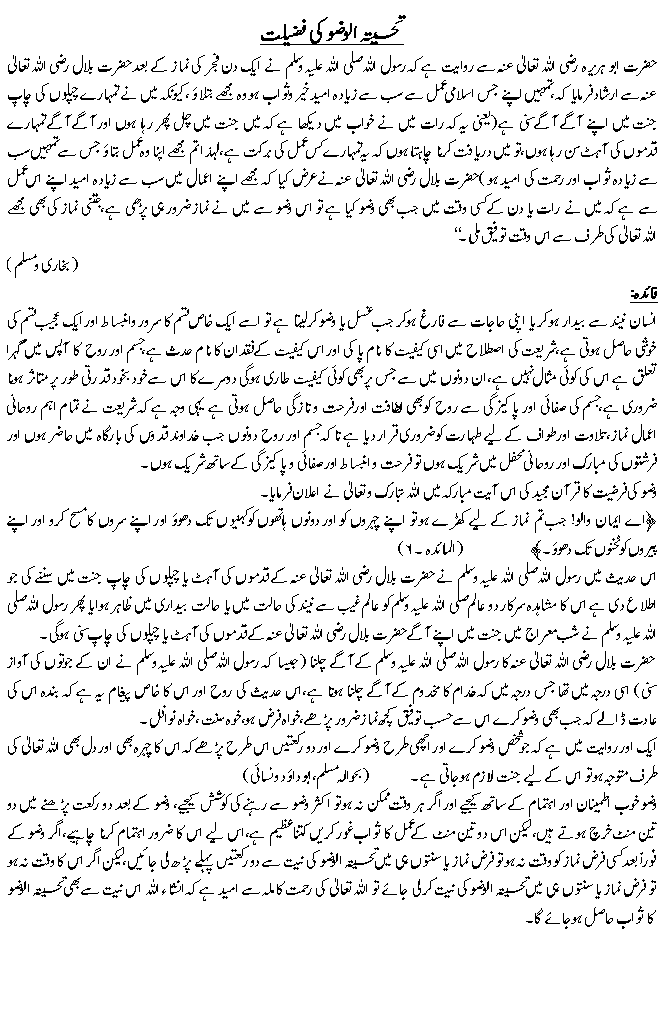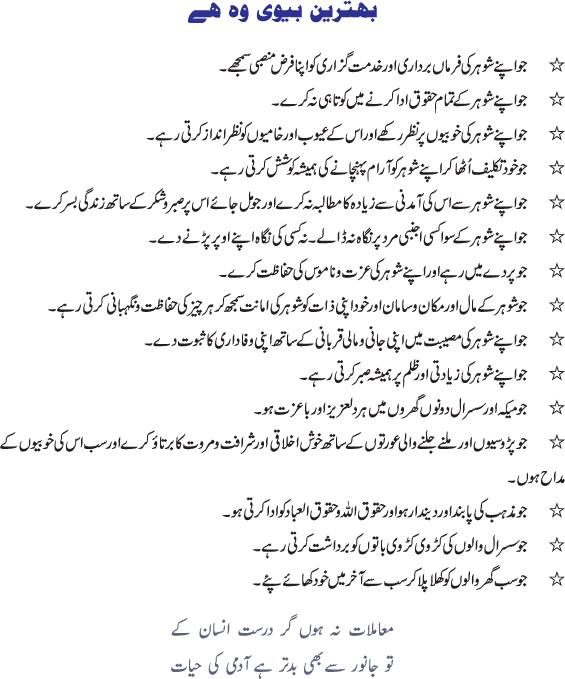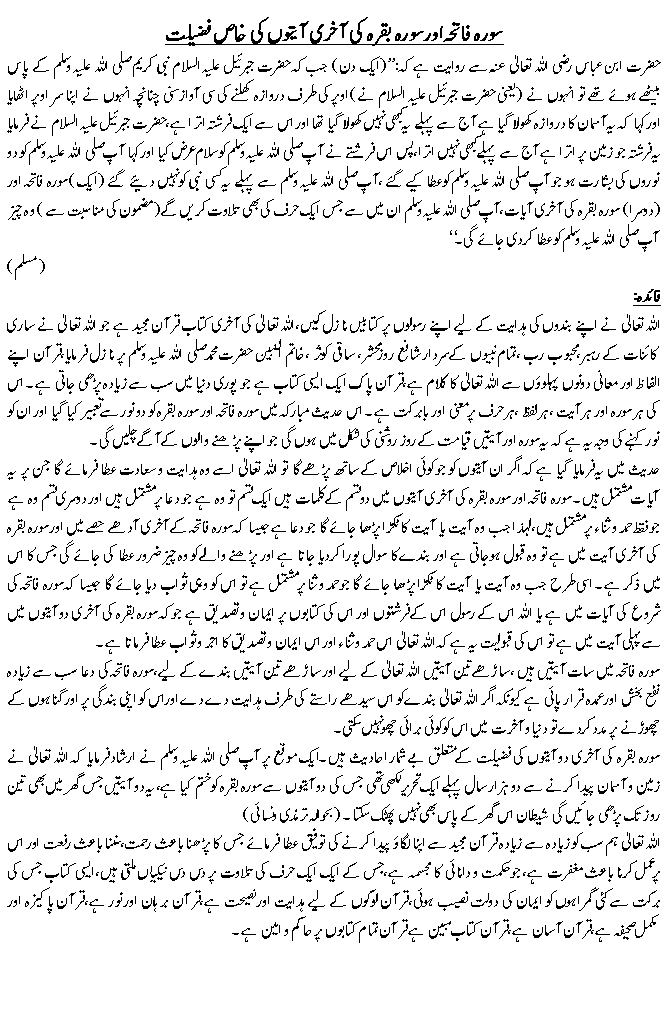
Tahiyatul-Wudu Ki Fazeelat
Easy But Few People Practice
Abdullah Bin Amr Bin Al-Aas (may Allah be pleased with him) narrated that the Prophet (peace be upon him) said, “There are two characteristics that whenever the Muslim maintains them will enter Jannah. These two traits are easy to possess. However, only a few people acquire them.
“Say Subhan Allah 10 times, Alhamduillah 10 times, and Allahu Akbar 10 times at the end of each Salah. By practicing this deed you earn 150 rewards for your tongue and 1,500 for the scale (of good deeds).
“And before you go to sleep say Subhan Allah 33 times, Alhamdulilah 33 times, and Allahu Akbar 34 times. By saying these words before you sleep you gain 100 good deeds for your tongue and 1,000 deeds for the scale.”
The companions (Allah be pleased with them) asked, “O Messenger (of Allah), how is it that these deeds are easy, yet few people do them?”
The Prophet (peace be upon him) replied, “Right after a person finishes praying, Shaitan comes to him and reminds him of something that he has to do. Therefore this person gets up and leaves without saying these words.
“Further, when he lies down on his bed, Shaitan comes to him and causes him to fall asleep before he mentions these words.” Abdullah Bin Amr (may Allah be pleased with him) said, “I saw the Messenger of Allah (peace be upon him) say these words using his hand to count them.” (Abu Dawood, no. 5065, Al-Tirmidhi, no. 3410, An-Nisa’i, no. 926 and Ahmad, 2/205)
Mother’s Day Special – Father’s Day Special
For us, Every Year and Month and Day and Hour and Minute and Second is Mother’s Day and Father’s Day
Parents are a Great Gift from Allah
When we were young, we loved to play with our Mum and Dad. When we grow up, many of us leave them and only come to them when we need something or when we are in trouble. No matter what, parents are always there and give everything they could just to make us happy. Below is what Allah mentioned in the Quran.
And We have enjoined on the man doing of good to his parents; with trouble did his mother bear him and with trouble did she bring him forth; and the bearing of him and the weaning of him was thirty months; until when he attains his maturity and reaches forty years, he says My Lord! grant me that I may give thanks for Thy favor which Thou hast bestowed on me and on my parents and that I may do good which pleases Thee and do good to me in respect of my offspring; surely I turn to Thee, and surely I am of those who submit. (Al_Quraan_046: 015)
Be Kind to your Parents:
And your Lord has commanded that you shall not serve (any) but Him, and goodness to your parents. If either or both of them reach old age with you, say not to them (so much as) “Ugh” nor chide them, and speak to them a generous word. And make yourself submissively gentle to them with compassion, and say: O my Lord! have compassion on them, as they brought me up (when I was) little. (Al_Quraan_017: 023-024)
And We have enjoined on man goodness to his parents, and if they contend with you that you should associate (others) with Me, of which you have no knowledge, do not obey them, to Me is your return, so I will inform you of what you did. (Al_Quraan_029: 008)
And We have enjoined man in respect of his parents– his mother bears him with faintings upon faintings and his weaning takes two years– saying: Be grateful to Me and to both your parents; to Me is the eventual coming. And if they contend with you that you should associate with Me what you have no knowledge of, do not obey them, and keep company with them in this world kindly, and follow the way of him who turns to Me, then to Me is your return, then will I inform you of what you did. (Al_Quraan_031: 014-015)
Hadeeth regarding Parents:
The Prophet Muhammad said, may Allah’s peace and blessings be upon him: Your Heaven lies under the feet of your mother (Ahmad, Nasai).
- May, 9
- 3046
- Human Rights
- More
Etiquettes of Reading The Qur’an
THE Qur’an which we recite contains the actual words of Allah revealed to Muhammad (peace be upon him). Therefore, we should observe the following when reciting it :
- Seek refuge in Allah before reading it (“A’oothu billaahi minash – shaytaanir-rajeem)”
- Have the intention that the recitation is purely to seek the pleasure of Allah alone.
- Recite with an alert heart that you may comprehend its meaning, considering while reciting it that Allah is speaking to you through the Qur’an.
- Make sure you are clean before touching the Qur’an. Do not read it when you are in a state of impurity.
- Do not read the Qur’an in lavatories or similar places.
- Read it slowly with pleasant sounds and rhythm.
- Prostrate wherever a verse requires prostration.
Behtreen Biwi

Behtreen Biwi
700 Percent Profit
During the caliphate of Umar (may Allah be pleased with him) there was a severe famine. The people of Madina were suffering due to a shortage of food.
A caravan of a thousand camels loaded with a large stock of food grains belonging to Uthman (may Allah be pleased with him) arrived from Shaam (Syria). Several merchants offered to buy all of it.
He asked them what profit they would pay. “Five percent,” they said. He answered that he could get a higher profit than that. They began to argue with him, saying that they did not know of any merchant who would offer him more than their quote.
He said to them, “I know of one who repays a profit of more than seven hundred to a dirham.” He then recited the verse of the Noble Qur’an in which Allah mentioned this profit. “The likeness of those who spend their wealth in the Way of Allah is as the likeness of a grain (of corn); it grows seven ears, and each ear has a hundred grains. Allah gives manifold increase to whom He pleases. And Allah is All-Sufficient for His creatures’ needs, All-Knower.” (Qur’an, 2:261)
“O traders! Bear witness with me that I donate all this to the poor people of Madinah!” said Uthman (may Allah be pleased with him).
Dear readers, whatever we give for the sake of Allah is really ours and whatever we keep with us will one day be someone else’s. Let us follow the footsteps of our Prophet and the pious Sahabah, with whom Allah was pleased, by helping the needy ones.
Why Our Dua’s Are Not Answered
IBRAHEEM IBN Adham (may Allah have mercy on him), a teacher and a companion of Sufyaan Ath-Thawree (d. 161H), was asked, “We supplicate, and we are not answered.”
So he replied:
- You know Allah, yet you do not obey Him.
- You recite the Qur’an, yet you do not act according to it.
- You know Satan, yet you have agreed with him.
- You proclaim that you love Muhammad (peace be upon him), yet you abandon his Sunnah.
- You proclaim your love for Paradise, yet you do not act to gain it.
- You proclaim your fear of the Fire, yet you do not prevent yourselves from sins.
- You say “Indeed death is true”, yet you have not prepared for it.
- You point out the faults with others, yet you do not look at your faults.
- You eat of what Allah has provided for you, yet you do not thank Him.
- You bury your dead, yet you do not take a lesson from it.
Visiting The Sick
The Messenger of Allah (peace be upon him) said there were five rights of a Muslim towards his brother in faith, out of which one is that, if one were to fall sick, it is incumbent upon the others to inquire about his welfare and to alleviate his sufferings. (Bukhari and Muslim)
This is part of a long Hadith. We find such exemplary teachings in Islam to inquire about the welfare of the sick and to take lead to alleviate their sufferings.
The Hadith teaches us to take care of our near and dear ones and share their sufferings. If someone happens to fall sick or suffer from some ailment, we are enjoined not only to inquire about his suffering but also to alleviate it. This is out of our deep sense of service to humanity at large.
The sick, neurotic and deranged persons deserve our highest sympathies. Naturally, it becomes the foremost duty of a Muslim to look after them and to care for and nurse them with due kindness and compassion.
One’s superior stance and happy position should at no moment make him too good and too wise, out of his sense of false pride, to become indifferent and discourteous to the sick and infirm, nor should he run away with the notion that he will never fall sick, or that he will never be in such a predicament that he would need others’ help at any moment in his life.
To show compassion to the sick and to nurse them is an act of piety that pleases Allah and His Messenger. It also creates a salubrious effect among individuals in society. It develops cordial relations among them and strengthens their bonds of friendship and brotherhood.
And this mutual cooperation and amity act as a cementing force to fortify the arch pillar of the structure of Islamic society, thereby bringing stability to the community and the nation at large.
- May, 4
- 3557
- Human Rights
- More
Surah Fatiha Aur Surah Baqarah Ki Fazeelat

Surah Fatiha Aur Surah Baqarah Ki Fazeelat
The Evils Of Backbiting
Backbiting – mere words – but they are words that bring upon the one who utters them shame and ignominy and that consigns him to the Fire. Such a person has given in to his vain desires and succumbed to his destructive tendencies.
The Prophet (peace be upon him) said: “A man might speak a word without thinking about its implications, but because of it, he will plunge into the Hellfire further than the distance between the east and west.“ [ Sahih al-Bukhari (6477) and Sahih Muslim (2988)]
A Muslim utters a word whereby he describes his brother Muslim in a negative way – either explicitly or implicitly – and it plunges the speaker into a clear and evident loss. And what could be a greater loss than for a person to say something that does nothing for him but rob him of his blessings and of the rewards for his good deeds? Then, if his good deeds run out, the sins of the one he has backbitten are taken from that person and foisted upon the speaker until he is hurled by them into Hell.
A Muslim utters a mere word upon his tongue thoughtlessly, without any consideration, and without thinking that he will be taken to task for it. Indeed, it is something about which many people are heedless.
Once Mu’adh b. Jabal, the illustrious Companion, asked the Prophet (peace be upon him) to inform him of some good work that would admit him into Paradise and distance him from the Hellfire. The Prophet (peace be upon him) mentioned to him the virtues of many good deeds, then said: “Shall I inform you of the foundation of all of that?”
Mu’adh said: “Certainly.”
The Prophet (peace be upon him) took hold of his own tongue and said: “Restrain yourself from this.”
Mu’adh then asked: “O Prophet of Allah! Are we held to task for the things that we say?”
The Prophet (peace be upon him) replied: “May your mother be bereaved of you, O Mu’adh! Does anything topple people headlong into the Hellfire save the harvests of their tongues?” [Sunan al-Tirmidhi (2616) and Sunan Ibn Majah (3973)]
The Prophet (peace be upon him) said: “Whoever can guarantee to me what is between his two lips and what is between his two legs, I can guarantee for him Paradise.“ [Sahîh al-Bukhârî (6474)]
The Prophet (peace be upon him), when he said “what is between his two lips” was alluding to the words that a person speaks. To guarantee it means to only speak what Allah is pleased with. When he said ” and what is between his legs” he was alluding to sexual relations, meaning that the person guarantees that he will not engage in any unlawful sexual activity that is prohibited by Allah.
Backbiting can be defined as the utterance of words whereby one mentions his fellow Muslim in a bad way or mentions him in a manner that he would be displeased with. It is called backbiting because a person generally berates another person in that person’s absence.
The Prophet (peace be upon him) defines backbiting in the following way, and his definition is preferred over any other:
He said: “Do you know what backbiting is?”
They said: “Allah and His Messenger know best.”
He said: “It is to mention about your brother something that he would dislike having mentioned about him.” [Sahih Muslim (2589)]
- May, 2
- 2810
- Human Rights
- More

